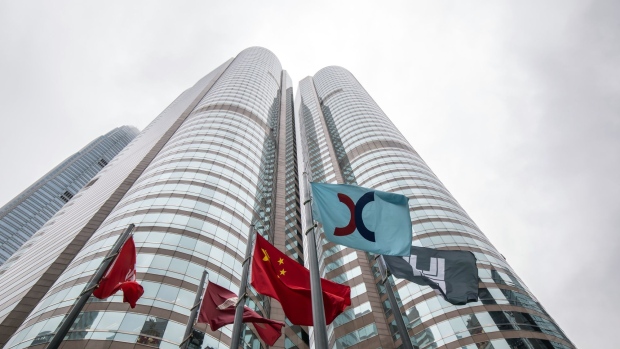Feb 14, 2023
China Stocks in Hong Kong Head for Correction as Selloff Extends
, Bloomberg News

(Bloomberg) -- A gauge of Chinese stocks in Hong Kong slid to the verge of a correction, as a selloff spurred by geopolitical tensions and doubts over the nation’s economic recovery extended.
The Hang Seng China Enterprises Index fell 1.3% on Wednesday, taking its losses from a Jan. 27 peak to more than 9%. A sharp three-month surge in the gauge hit a stumbling block in recent weeks as weakness among manufacturers and tepid sales of cars and homes dented the optimism sparked by the nation’s faster-than-expected reopening.
Global fund managers from abrdn plc and Fidelity International are pinning hopes on potential pro-growth policies from the National People’s Congress in March to resuscitate the rally. Still, with hedge funds having piled into Chinese equities last quarter, adding to what’s already the most-crowded trade according to a Bank of America Corp. survey, there’s a chance gains going ahead may be small.
READ: Fidelity, abrdn See China Congress Giving Stocks Their Mojo Back
“It will take another two weeks before we learn more information about the Chinese economy’s direction via the key two sessions,” said Banny Lam, head of research at Ceb International Inv Corp Ltd. “In this period of policy vacuum, people would choose to take profit first.”
The HSCEI measure rallied about 50% between November and January as China’s dismantling of its Covid Zero policy led to a surge in consumption, with catering, tourism and other in-person businesses recording big increases in revenue over the Lunar New Year holiday.
The recent equity decline, along with positioning data, indicate investors are looking for more policy support to drive further gains. The congress meeting typically sets the tone for economic policies and during last year’s gathering, Beijing outlined an aggressive growth target while laying the ground for more fiscal stimulus.
Read: Hedge Funds Pile Into World’s Most Crowded Trade: China Today
Money managers at abrdn plc and Fidelity International see China’s leadership displaying renewed determination in supporting growth at the NPC, with the consumer sector expected to be a key beneficiary.
“I don’t think the reopening has been fully priced in at this point,” Elizabeth Kwik, abrdn’s Asian equities investment director, said in an interview last week. “In the coming months, especially with the upcoming two sessions, we expect to see more supportive policies” in the form of consumption stimulus and more relaxed real estate measures, she said.
Victoria Mio, Fidelity’s head of Asia Pacific equity research, is looking to the NPC for “pro-growth policy direction and pro-private-sector policy environment.”
Balloon Tension
Hong Kong’s benchmark Hang Seng Index dropped 1.4%, while the CSI 300 Index of mainland shares closed 0.5% lower.
A rise in Sino-American tensions over a suspected spy balloon has also soured sentiment in recent days.
Meanwhile, China’s central bank added more cash into the financial system on Wednesday to meet a rapid rebound in loan demand.
“It is a short-term correction and both HK and China markets will be likely to bounce back in March as the National People’s Congress will guide the markets with more policy support on different sectors of China’s economy,” said Lam of Ceb.
--With assistance from Abhishek Vishnoi and Ishika Mookerjee.
©2023 Bloomberg L.P.






